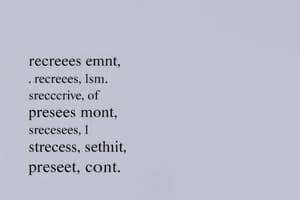Podcast
Questions and Answers
Which sentence correctly uses the present continuous tense?
Which sentence correctly uses the present continuous tense?
- Valeria visits Machu Picchu every summer.
- Sofia is living in Cusco this year while she studies. (correct)
- Ricardo speaks Quechua fluently.
- Mateo usually eats ceviche on Sundays.
What is implied when saying 'Rosa is working in Lima this summer'?
What is implied when saying 'Rosa is working in Lima this summer'?
- Rosa works in Lima only for this summer. (correct)
- Rosa dislikes her job in Lima.
- Rosa never worked in Lima before.
- Rosa has a permanent job in Lima.
Choose the sentence that uses the present simple correctly to describe a routine activity.
Choose the sentence that uses the present simple correctly to describe a routine activity.
- Carlos is hiking the Inca Trail every weekend.
- Luisa is enjoying the Peruvian coffee.
- Gabriela is visiting the Sacred Valley this month.
- Andres plays the cajón in a local band. (correct)
Which sentence indicates a habitual action?
Which sentence indicates a habitual action?
Select the sentence where the present continuous describes a temporary situation.
Select the sentence where the present continuous describes a temporary situation.
Which of the following accurately uses the present simple in the negative form?
Which of the following accurately uses the present simple in the negative form?
What does the sentence 'They aren't visiting Huaraz this year' imply?
What does the sentence 'They aren't visiting Huaraz this year' imply?
Choose the sentence that correctly uses the present simple to express a general truth.
Choose the sentence that correctly uses the present simple to express a general truth.
Which sentence correctly contrasts a present simple habit with a present continuous temporary action?
Which sentence correctly contrasts a present simple habit with a present continuous temporary action?
What is the difference in meaning between 'I live in Puno' and 'I am living in Puno'?
What is the difference in meaning between 'I live in Puno' and 'I am living in Puno'?
Flashcards
Present Simple
Present Simple
Describes habitual actions, general truths, and facts. Example: "Sofia works in Lima." (habitual action)
Present Continuous
Present Continuous
Used for actions happening now, or around now, and temporary situations. Example: "Ricardo is hiking in the Andes this week." (temporary situation)
Present Simple Affirmative
Present Simple Affirmative
Affirmative: Subject + base form of the verb (add -s/-es for he/she/it). Example: "Valeria lives in Cusco."
Present Simple Negative
Present Simple Negative
Signup and view all the flashcards
Present Continuous Affirmative
Present Continuous Affirmative
Signup and view all the flashcards
Present Continuous Negative
Present Continuous Negative
Signup and view all the flashcards
General Truth Example
General Truth Example
Signup and view all the flashcards
Temporary Project Example
Temporary Project Example
Signup and view all the flashcards
Habitual Action
Habitual Action
Signup and view all the flashcards
Study Notes
- The present simple and present continuous tenses are used to describe actions happening in the present, but they differ in their usage and the type of actions they describe
- The present simple describes habits, routines, general truths, and permanent situations, while the present continuous describes actions happening at the moment of speaking, temporary situations, and planned future events
Present Simple
- Used for habits, routines, general truths, and permanent situations
Affirmative Form: Subject + Base form of the verb (add -s/-es for third person singular)
- Yo trabajo en Lima (I work in Lima)
- Verb: trabajo
- Context: A statement of fact about where I work
- Tú comes ceviche los domingos (You eat ceviche on Sundays)
- Verb: comes
- Context: A routine or habit of eating ceviche on Sundays
- Él vive en Cusco (He lives in Cusco)
- Verb: vive
- Context: A permanent situation or where he resides
- Ella estudia ingeniería (She studies engineering)
- Verb: estudia
- Context: A general fact about what she studies
- Nosotros hablamos español (We speak Spanish)
- Verb: hablamos
- Context: A general truth about the language we speak
- Ustedes beben chicha morada (You (plural) drink chicha morada)
- Verb: beben
- Context: A habit or custom of drinking chicha morada
- Ellos preparan papa rellena (They prepare causa rellena)
- Verb: preparan
- Context: A routine or habit of preparing papa rellena
Negative Form: Subject + do/does + not + base form of the verb
- Yo no trabajo los domingos (I do not work on Sundays)
- Verb: trabajo
- Context: Describing a habit of not working on Sundays
- Tú no comes picarones (You do not eat picarones)
- Verb: comes
- Context: Describing a food that you generally do not eat
- Él no vive en Arequipa (He does not live in Arequipa)
- Verb: vive
- Context: Stating that his permanent residence is not in Arequipa
- Ella no estudia medicina (She does not study medicine)
- Verb: estudia
- Context: Describing what she does not study as a general fact
- Nosotros no hablamos quechua (We do not speak Quechua)
- Verb: hablamos
- Context: Stating a general truth about the language we do not speak
- Ustedes no beben cerveza cusqueña (You (plural) do not drink Cusqueña beer)
- Verb: beben
- Context: Describing a beverage that they generally do not drink
- Ellos no preparan lomo saltado (They do not prepare lomo saltado)
- Verb: preparan
- Context: Describing a dish they generally do not prepare
Present Continuous
- Used for actions happening at the moment of speaking, temporary situations, and planned future events
Affirmative Form: Subject + estar + verb + -ando/-iendo
- Yo estoy trabajando ahora (I am working now)
- Verb: trabajando
- Context: An action happening at the moment of speaking
- Tú estás comiendo anticuchos (You are eating anticuchos)
- Verb: comiendo
- Context: An action happening at the moment of speaking
- Él está viviendo en Tacna por un mes (He is living in Tacna for a month)
- Verb: viviendo
- Context: A temporary situation
- Ella está estudiando para el examen (She is studying for the exam)
- Verb: estudiando
- Context: An action happening around now or a temporary situation
- Nosotros estamos hablando por teléfono (We are talking on the phone)
- Verb: hablando
- Context: An action happening at the moment of speaking
- Ustedes están bebiendo emoliente (You (plural) are drinking emoliente)
- Verb: bebiendo
- Context: An action happening at the moment of speaking
- Ellos están preparando pachamanca para mañana (They are preparing pachamanca for tomorrow)
- Verb: preparando
- Context: A planned future event
Negative Form: Subject + no + estar + verb + -ando/-iendo
- Yo no estoy trabajando hoy (I am not working today)
- Verb: trabajando
- Context: Describing an action not happening temporarily
- Tú no estás comiendo causa (You are not eating causa)
- Verb: comiendo
- Context: Describing an action not happening at the moment
- Él no está viviendo en Iquitos (He is not living in Iquitos)
- Verb: viviendo
- Context: Stating that he is not temporarily living in Iquitos
- Ella no está estudiando francés (She is not studying French)
- Verb: estudiando
- Context: Describing an activity not happening around now
- Nosotros no estamos hablando de política (We are not talking about politics)
- Verb: hablando
- Context: Describing an action not happening at the moment
- Ustedes no están bebiendo pisco sour (You (plural) are not drinking pisco sour)
- Verb: bebiendo
- Context: Describing an action not happening at the moment
- Ellos no están preparando juane hoy (They are not preparing juane today)
- Verb: preparando
- Context: Stating that they are not preparing the dish today
Key Differences
- The present simple is used for permanent or habitual actions, while the present continuous is used for temporary or ongoing actions
- The present simple describes general truths or facts, while the present continuous describes what is happening now or around now
- Certain verbs (stative verbs) are generally not used in the continuous form unless describing a change in state
Stative Verbs
- Stative verbs describe states, not actions, and are generally not used in the present continuous unless indicating a change of state or a temporary situation
- Examples of stative verbs include: ser, estar, creer, saber, amar, odiar, preferir, tener, necesitar, etc.
- For example: "Yo sé la respuesta" (I know the answer - state) vs. "Él está sabiendo la verdad" (He is finding out the truth - change of state)
Studying That Suits You
Use AI to generate personalized quizzes and flashcards to suit your learning preferences.




